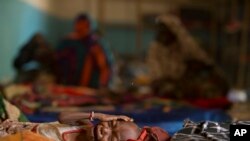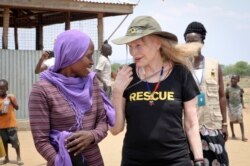Groups of women had traveled for days to find care for their starving children in Chad, blankly staring in exhaustion and with little hope. But other women smiled, relieved to see their children "fattened" by a new and simplified initiative for hunger.
In an interview with The Associated Press, actress Mia Farrow recounted the scene during her visit to the Central African nation's Mangalme area as an envoy for the International Rescue Committee.
"Once you see a child dying of hunger in a world where it isn't necessary, in a world of abundance ... you have frustration," she said. "When I saw this simple solution ... I said yes, there is an answer."
She is promoting the IRC's approach to treating severe and moderate acute malnutrition, one that contrasts with the widespread method using two different products administered by two different agencies.
UNICEF provides a fortified peanut butter treatment to children with severe acute malnutrition, while the World Food Program, another United Nations agency, provides a blended flours treatment to children with moderate acute malnutrition. A child with moderate acute malnutrition could arrive at a facility that only serves severe cases and not receive treatment.
Efficiency, cost
In Chad, about 350,000 children are suffering from acute malnutrition. That number could grow as the landlocked Sahel nation faces a growing extremist threat in its Lake Chad region and refugees continue to arrive from neighboring countries. Rapid desertification exacerbates the hunger and poverty.
Chad ranks 186th of 189 countries in the 2018 Human Development Index and has one of the world's highest levels of hunger, according to the World Food Program. More than 66% of the population of 15.5 million lives in severe poverty.
The IRC hopes to make treating malnutrition more efficient and less costly. CEO David Miliband has said the new approach could save millions of lives over the next decade since only 20% of some 50 million acutely malnourished children worldwide have access to treatment.
The IRC hopes its pilot programs in Chad and Mali can help inform World Health Organization guidelines on treating malnutrition and allow health workers to deliver the treatments within communities and not just at clinics.
"We don't have to watch children die," Farrow said.
'Promising' approach
World Food Program spokesman Herve Verhoosel said the agency "fully supports testing and building the evidence for simplified approaches such as the one being put forward by IRC. The approach shows promise, and we're enthusiastic about it as one of the strategies that may help improve treatment of acute malnutrition."
Malnutrition is a major cause of maternal and child illness and death in Chad, he said. He acknowledged that in remote settings some women and children may walk for hours or days to a clinic only to find treatment for one type of malnutrition available — and could be turned away if they don't fit the criteria.
"Simplified protocols could provide a promising solution to these issues," he said. For them to be effective, "we need to ensure that these services are also available in communities, not just in health clinics."
He noted that some evidence gaps remain on the effectiveness of the approach but said U.N. agencies are working with the IRC to generate needed data.
The IRC pilot in Chad is being carried out in partnership with Chad's health ministry, WFP and UNICEF. Nearly 2,000 malnourished children already have been admitted.





